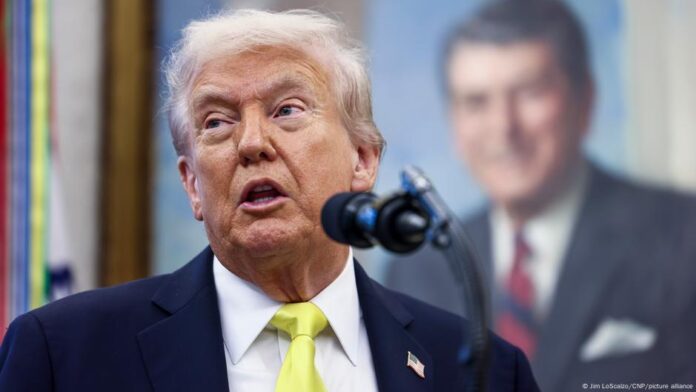The Trump administration is waging war of sorts against Venezuelan drug gangs and has authorized the CIA to undertake covert operations within the country: That revelation came from Donald Trump himself, who confirmed this week that he had given permission for his foreign intelligence service to act inside another country. It was a fairly unusual admission — these orders are usually closely guarded state secrets.
Given the long and checkered history of covert US interventions into Latin American politics, it gave Venezuelan dictator Nicolas Maduro the opportunity to accuse Trump of attempting regime change.
Trump has maintained a particular interest in Venezuela, more than most other Latin American nations.
Where the US President has merely flexed his muscles on trade issues with other nations in the region, throughout his 2024 election campaign and second presidency, he has labeled Venezuelan migrants as criminals, sought mass deportations of them back to their homeland, and decried the activities of Venezuelan gangs and drug cartels.
Trump’s grievances have since converged on Maduro himself. The US President and his officials have directly linked Maduro to criminal groups several times. In August, the US increased the reward for information leading to Maduro’s arrest to $50 million (around €43 million).
Things escalated further in September when the US began launching naval strikes against alleged drug smuggler boats in the Caribbean. At the start of October, Trump declared the US was in a “non-international armed conflict” with drug cartels.
Six strikes killing at least 27 people have now been carried out against vessels in the Caribbean. The Trump administration now labels cartel activity a “narcoterrorist” threat.
A long, checkered history in Latin America
Trump remarks confirming CIA activity in Venezuela have rekindled memories of the US’ 20th century legacy of involvement in the region.
For decades, the US intervened in Latin American politics, attempting to shape friendly regimes via coups, assassinations and invasions.
The CIA itself supported coups against the Guatemalan government in 1954 and the Brazilian one in 1964, and helped foster conditions that led to the overthrow of the Chilean government of Salvador Allende in 1973.
History repeating itself?
Among notably unsuccessful US attempts at regime change was the disastrous Bay of Pigs invasion in Cuba in 1961, and multiple attempts to assassinate Cuba’s former leader Fidel Castro.
The most recent high-profile intervention in the region was the 1989 invasion of Panama to oust Manuel Noriega and extradite him on drug trafficking charges. Now, more than 35 years after that intervention, history feels like it’s repeating.
Pointing out the return of US spies to Latin America may have been a misstep on Trump’s part though, experts say.
“The CIA is one of several instruments of US foreign policy,” says Carlos Perez Ricart, an international relations expert at the Center for Economic Research and Teaching in Mexico. But “acknowledging the CIA’s involvement in Venezuela is detrimental to [Trump’s] overall objectives,” he told DW.
Back to the future in Latin America
Trump and his allies have signaled concerns about increased influence from powers like China, and earlier this year intervened directly to secure the Panama Canal.
Trump has also been a vocal supporter of certain personal allies and has used economics as a weapon. For example, he has threatened to cut aid from Argentina if President Javier Milei and his government are voted out in upcoming elections and has also applied punitive tariffs on Brazil in response to the prosecution of former Brazilian president Jair Bolsonaro.
Trump’s interventions in Venezuela may present him with a range of options, among them the potential to oust a dictator widely acknowledged as having lost Venezuela’s most recent presidential election.
Resolving his aims of quashing drug cartels and cutting a deal to return Venezuelan migrants, which has so far eluded him, would also appeal to the self-styled dealmaker president.
And there’s economic opportunity. Venezuela is resource rich — particularly in fossil fuels — and economically close to China, which Trump sees as the main barrier to US global dominance.
Venezuela a ‘special case’
Paul Hare, a former British Ambassador to Cuba who was previously assigned to the UK’s diplomatic mission in Venezuela, said Trump’s approach to the Maduro regime was a “special case” rather than a signal of increasing US intervention into the region.
“Trump doesn’t want to go into history as the warmaking president creating conflict,” Hare, now a lecturer in international relations at Boston University, told DW. “He wants to do some sort of deal [with Venezuela]. “They are concerned with, obviously, the migration issue, the drugs issue.”
Beyond supporting his personal allies, a return to extensive interventions in Latin American politics are unlikely to be a priority for the US president in the remaining three years of his second and final term.
“I don’t think he’s terribly interested in Latin America as an area,” Hare said. “I do think there are a lot of voices who see this as the chance to topple Maduro and maybe even to provoke change in Cuba, however that might be done.”
The momentum for political change in Venezuela, further spurred by opposition leader Maria Corina Machado recently winning the Nobel Peace Prize, could well be aided by the current US intervention. But Hare also thinks Maduro could still find a way to hold onto power.
“I don’t think it’s inconceivable that Maduro may come round [to Trump] and say, ‘yes, we’ll do a deal on the deportations,’ or ‘we’ll do the things you like, if you agree to stand off’.”
Luis García Casas contributed to this report
Source link






